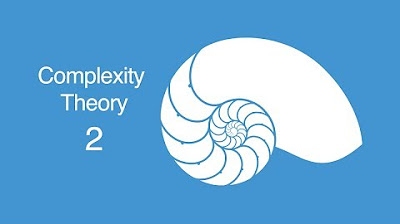Systems Theory Overview
Summary
TLDRSystems theory is an interdisciplinary framework used to model and understand diverse phenomena across biology, society, and technology. Emerging in the 20th century, it builds on abstract concepts from fields like philosophy and mathematics, offering a universal approach applicable to all domains. A system consists of interrelated parts within a boundary, interacting with the environment through inputs and outputs. Systems may evolve based on energy processing, contributing to either useful or wasteful outcomes. Key topics include emergence, self-organization, and cybernetics, with applications ranging from engineering to psychology, emphasizing a holistic understanding of complex systems.
Takeaways
- 😀 Systems theory is a set of concepts used to describe various phenomena using a model called a system.
- 😀 The origins of systems theory can be traced back to ancient theories about the world, such as the idea of basic elements like earth, water, fire, and air.
- 😀 Unlike more specific areas of science, systems theory is designed to be universally applicable to all domains, ranging from biology to social and technical systems.
- 😀 A system consists of elements that form a whole, existing within a boundary that separates it from the environment.
- 😀 Most systems are open, meaning they interact with their environment through the exchange of energy or resources (inputs and outputs).
- 😀 When a system receives energy or resources from the environment, it processes them to create an output, which can be valuable energy or waste (entropy).
- 😀 Systems theory helped in the development of the steam engine, where scientists used the model to understand energy efficiency and waste.
- 😀 The concept of nesting or encapsulation in systems theory allows us to analyze systems at various levels while simplifying complexity.
- 😀 Emergence in systems theory explores how parts within a system can self-organize to create new structures or behaviors.
- 😀 Cybernetics, a subfield of systems theory, focuses on control mechanisms that allow systems to adapt to changes through feedback loops.
- 😀 Systems theory has broad applications, forming the foundation for disciplines like systems psychology, engineering, and ecology, all emphasizing a holistic and contextualized approach.
Q & A
What is systems theory?
-Systems theory is a theoretical framework used to describe various phenomena by modeling them as systems. It aims to apply general concepts to a wide range of domains, from biology to social and technical systems.
How did systems theory originate?
-Systems theory emerged during the 20th century, building on ideas from existing frameworks such as philosophy and mathematics. It evolved into a more abstract, universally applicable theory that can describe various systems.
What defines a system in systems theory?
-A system is defined as a set of elements that form a whole. It exists within an environment, with a boundary that separates its interior from the exterior.
What is the difference between an open system and an isolated system?
-An open system interacts with its environment, exchanging energy and resources, while an isolated system does not interact with its environment.
What are inputs and outputs in the context of a system?
-Inputs refer to energy or resources entering the system from its environment, while outputs refer to energy or resources leaving the system to the environment.
What is the concept of entropy in systems theory?
-Entropy refers to the lack of order or disarrangement within a system, often understood as waste. In systems, it represents the negative value or wasted energy from processes that do not contribute positively to the system's environment.
How was the systems theory model applied in the development of the steam engine?
-In the steam engine's development, systems theory was used to analyze the relationship between the amount of fuel input, power output, and wasted heat energy, leading to the concept of efficiency in the system.
What is the concept of nesting or encapsulation in systems theory?
-Nesting, or encapsulation, refers to the idea that elements of a system can form part of larger systems. This helps to analyze a system at various levels while managing its underlying complexity.
What is emergence in the context of systems theory?
-Emergence refers to the phenomenon where the parts of a system function together or self-organize, creating new structures or behaviors that are not evident when examining individual parts in isolation.
What areas does systems theory apply to?
-Systems theory has applications in various fields, including systems psychology, systems engineering, and systems ecology. It emphasizes a holistic and contextualized approach to understanding complex phenomena.
Outlines

This section is available to paid users only. Please upgrade to access this part.
Upgrade NowMindmap

This section is available to paid users only. Please upgrade to access this part.
Upgrade NowKeywords

This section is available to paid users only. Please upgrade to access this part.
Upgrade NowHighlights

This section is available to paid users only. Please upgrade to access this part.
Upgrade NowTranscripts

This section is available to paid users only. Please upgrade to access this part.
Upgrade Now5.0 / 5 (0 votes)





